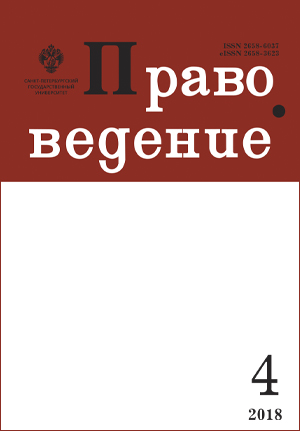Methodological aspects of ecological criminology
DOI:
https://doi.org/10.21638/spbu25.2018.409Abstract
The article discusses the prerequisites for identifying an independent direction of criminological research — ecological criminology. The influence of the main philosophical doctrines on the formation of modern ecological legislation is studied. It is noted that the process of ecologization of the social sphere, which includes legal institutions, has touched upon criminological research, their appearance was the result of this process. Ecological criminology is directly related to the general criminological theory and the result of its development. At the same time, it is methodologically closely connected with the science of environmental law. The article covers the discussion about the name of the direction of criminology. Linguistic difficulties associated with the foreign origin of certain terms are noted. For more than 25 years, the study of a complex of phenomena related to environmental crime in world criminology has been viewed as an independent direction of criminological research. At the same time, it is premature to say that this direction has been established. Questions of methodology remain unresolved: about the object, subject, method, and terminology. This article is devoted to the disclosure of these major problems. The article substantiates the use of the term “environmental criminology” in domestic science. On the basis of systematization of the main approaches to the definition of the concept of “crime,” formed within the framework of criminological research (legal, social and natural law), the author makes conclusions about the content of the subject and object of environmental criminology. The peculiarities of the construction of the criminal law norm and the concept of “public danger” are examined. The validity of the inclusion of environmental harm in the object and subject of research carried out in the framework of environmental criminology is substantiated. Analyzing the position of the social approach, the author justifies the need to include in the object and subject of environmental criminology problems associated with the actual or potential transformation of environmentally significant behavior into criminal. The features of the methodology of environmental criminology, which are manifested in the fact that it uses not only the methods typical for criminology and law, but also for natural sciences, are considered.
Keywords:
ecological criminology, criminology, environmental law, crime, environmental
Downloads
References
Downloads
Published
How to Cite
Issue
Section
License
Articles of "Pravovedenie" are open access distributed under the terms of the License Agreement with Saint Petersburg State University, which permits to the authors unrestricted distribution and self-archiving free of charge.




